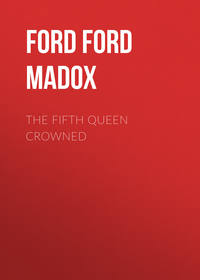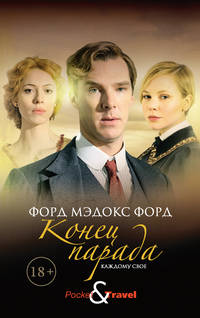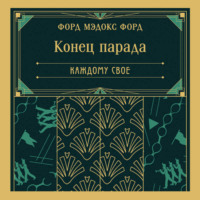 полная версия
полная версияThe Good Soldier
At that time, he says, he went about deliberately looking for some woman who could help him. He found several – for there were quite a number of ladies in his set who were capable of agreeing with this handsome and fine fellow that the duties of a feudal gentleman were feudal. He would have liked to pass his days talking to one or other of these ladies. But there was always an obstacle – if the lady were married there would be a husband who claimed the greater part of her time and attention. If, on the other hand, it were an unmarried girl, he could not see very much of her for fear of compromising her. At that date, you understand, he had not the least idea of seducing any one of these ladies. He wanted only moral support at the hands of some female, because he found men difficult to talk to about ideals. Indeed, I do not believe that he had, at any time, any idea of making any one his mistress. That sounds queer; but I believe it is quite true as a statement of character.
It was, I believe, one of Leonora's priests – a man of the world – who suggested that she should take him to Monte Carlo. He had the idea that what Edward needed, in order to fit him for the society of Leonora, was a touch of irresponsibility. For Edward, at that date, had much the aspect of a prig. I mean that, if he played polo and was an excellent dancer he did the one for the sake of keeping himself fit and the other because it was a social duty to show himself at dances, and, when there, to dance well. He did nothing for fun except what he considered to be his work in life. As the priest saw it, this must for ever estrange him from Leonora – not because Leonora set much store by the joy of life, but because she was out of sympathy with Edward's work. On the other hand, Leonora did like to have a good time, now and then, and, as the priest saw it, if Edward could be got to like having a good time now and then, too, there would be a bond of sympathy between them. It was a good idea, but it worked out wrongly.
It worked out, in fact, in the mistress of the Grand Duke. In anyone less sentimental than Edward that would not have mattered. With Edward it was fatal. For, such was his honourable nature, that for him to enjoy a woman's favours made him feel that she had a bond on him for life. That was the way it worked out in practice. Psychologically it meant that he could not have a mistress without falling violently in love with her. He was a serious person – and in this particular case it was very expensive. The mistress of the Grand Duke – a Spanish dancer of passionate appearance – singled out Edward for her glances at a ball that was held in their common hotel. Edward was tall, handsome, blond and very wealthy as she understood – and Leonora went up to bed early. She did not care for public dances, but she was relieved to see that Edward appeared to be having a good time with several amiable girls. And that was the end of Edward – for the Spanish dancer of passionate appearance wanted one night of him for his beaux yeux. He took her into the dark gardens and, remembering suddenly the girl of the Kilsyte case, he kissed her. He kissed her passionately, violently, with a sudden explosion of the passion that had been bridled all his life – for Leonora was cold, or at any rate, well behaved. La Dolciquita liked this reversion, and he passed the night in her bed.
When the palpitating creature was at last asleep in his arms he discovered that he was madly, was passionately, was overwhelmingly in love with her. It was a passion that had arisen like fire in dry corn. He could think of nothing else; he could live for nothing else. But La Dolciquita was a reasonable creature without an ounce of passion in her. She wanted a certain satisfaction of her appetites and Edward had appealed to her the night before. Now that was done with, and, quite coldly, she said that she wanted money if he was to have any more of her. It was a perfectly reasonable commercial transaction. She did not care two buttons for Edward or for any man and he was asking her to risk a very good situation with the Grand Duke. If Edward could put up sufficient money to serve as a kind of insurance against accident she was ready to like Edward for a time that would be covered, as it were, by the policy. She was getting fifty thousand dollars a year from her Grand Duke; Edward would have to pay a premium of two years' hire for a month of her society. There would not be much risk of the Grand Duke's finding it out and it was not certain that he would give her the keys of the street if he did find out. But there was the risk – a twenty per cent risk, as she figured it out. She talked to Edward as if she had been a solicitor with an estate to sell – perfectly quietly and perfectly coldly without any inflections in her voice. She did not want to be unkind to him; but she could see no reason for being kind to him. She was a virtuous business woman with a mother and two sisters and her own old age to be provided comfortably for. She did not expect more than a five years' further run. She was twenty-four and, as she said: "We Spanish women are horrors at thirty." Edward swore that he would provide for her for life if she would come to him and leave off talking so horribly; but she only shrugged one shoulder slowly and contemptuously. He tried to convince this woman, who, as he saw it, had surrendered to him her virtue, that he regarded it as in any case his duty to provide for her, and to cherish her and even to love her – for life. In return for her sacrifice he would do that. In return, again, for his honourable love she would listen for ever to the accounts of his estate. That was how he figured it out.
She shrugged the same shoulder with the same gesture and held out her left hand with the elbow at her side:
"Enfin, mon ami," she said, "put in this hand the price of that tiara at Forli's or…" And she turned her back on him.
Edward went mad; his world stood on its head; the palms in front of the blue sea danced grotesque dances. You see, he believed in the virtue, tenderness and moral support of women. He wanted more than anything to argue with La Dolciquita; to retire with her to an island and point out to her the damnation of her point of view and how salvation can only be found in true love and the feudal system. She had once been his mistress, he reflected, and by all the moral laws she ought to have gone on being his mistress or at the very least his sympathetic confidante. But her rooms were closed to him; she did not appear in the hotel. Nothing: blank silence. To break that down he had to have twenty thousand pounds. You have heard what happened. He spent a week of madness; he hungered; his eyes sank in; he shuddered at Leonora's touch. I dare say that nine-tenths of what he took to be his passion for La Dolciquita was really discomfort at the thought that he had been unfaithful to Leonora. He felt uncommonly bad, that is to say – oh, unbearably bad, and he took it all to be love. Poor devil, he was incredibly naïve. He drank like a fish after Leonora was in bed and he spread himself over the tables, and this went on for about a fortnight. Heaven knows what would have happened; he would have thrown away every penny that he possessed.
On the night after he had lost about forty thousand pounds and whilst the whole hotel was whispering about it, La Dolciquita walked composedly into his bedroom. He was too drunk to recognize her, and she sat in his arm-chair, knitting and holding smelling salts to her nose – for he was pretty far gone with alcoholic poisoning – and, as soon as he was able to understand her, she said:
"Look here, mon ami, do not go to the tables again. Take a good sleep now and come and see me this afternoon."
He slept till the lunch-hour. By that time Leonora had heard the news. A Mrs Colonel Whelan had told her. Mrs Colonel Whelan seems to have been the only sensible person who was ever connected with the Ashburnhams. She had argued it out that there must be a woman of the harpy variety connected with Edward's incredible behaviour and mien; and she advised Leonora to go straight off to Town – which might have the effect of bringing Edward to his senses – and to consult her solicitor and her spiritual adviser. She had better go that very morning; it was no good arguing with a man in Edward's condition.
Edward, indeed, did not know that she had gone. As soon as he awoke he went straight to La Dolciquita's room and she stood him his lunch in her own apartments. He fell on her neck and wept, and she put up with it for a time. She was quite a good-natured woman. And, when she had calmed him down with Eau de Mélisse, she said: "Look here, my friend, how much money have you left? Five thousand dollars? Ten?" For the rumour went that Edward had lost two kings' ransoms a night for fourteen nights and she imagined that he must be near the end of his resources.
The Eau de Mélisse had calmed Edward to such an extent that, for the moment, he really had a head on his shoulders. He did nothing more than grunt:
"And then?"
"Why," she answered, "I may just as well have the ten thousand dollars as the tables. I will go with you to Antibes for a week for that sum."
Edward grunted: "Five." She tried to get seven thousand five hundred; but he stuck to his five thousand and the hotel expenses at Antibes. The sedative carried him just as far as that and then he collapsed again. He had to leave for Antibes at three; he could not do without it. He left a note for Leonora saying that he had gone off for a week with the Clinton Morleys, yachting.
He did not enjoy himself very much at Antibes. La Dolciquita could talk of nothing with any enthusiasm except money, and she tired him unceasingly, during every waking hour, for presents of the most expensive description. And, at the end of a week, she just quietly kicked him out. He hung about in Antibes for three days. He was cured of the idea that he had any duties towards La Dolciquita – feudal or otherwise. But his sentimentalism required of him an attitude of Byronic gloom – as if his court had gone into half-mourning. Then his appetite suddenly returned, and he remembered Leonora. He found at his hotel at Monte Carlo a telegram from Leonora, dispatched from London, saying; "Please return as soon as convenient." He could not understand why Leonora should have abandoned him so precipitately when she only thought that he had gone yachting with the Clinton Morleys. Then he discovered that she had left the hotel before he had written the note. He had a pretty rocky journey back to town; he was frightened out of his life – and Leonora had never seemed so desirable to him.
V
I CALL this the Saddest Story, rather than "The Ashburnham Tragedy", just because it is so sad, just because there was no current to draw things along to a swift and inevitable end. There is about it none of the elevation that accompanies tragedy; there is about it no nemesis, no destiny. Here were two noble people – for I am convinced that both Edward and Leonora had noble natures – here, then, were two noble natures, drifting down life, like fireships afloat on a lagoon and causing miseries, heart-aches, agony of the mind and death. And they themselves steadily deteriorated. And why? For what purpose? To point what lesson? It is all a darkness.
There is not even any villain in the story – for even Major Basil, the husband of the lady who next, and really, comforted the unfortunate Edward – even Major Basil was not a villain in this piece. He was a slack, loose, shiftless sort of fellow – but he did not do anything to Edward. Whilst they were in the same station in Burma he borrowed a good deal of money – though, really, since Major Basil had no particular vices, it was difficult to know why he wanted it. He collected – different types of horses' bits from the earliest times to the present day – but, since he did not prosecute even this occupation with any vigour, he cannot have needed much money for the acquirement, say, of the bit of Genghis Khan's charger – if Genghis Khan had a charger. And when I say that he borrowed a good deal of money from Edward I do not mean to say that he had more than a thousand pounds from him during the five years that the connection lasted. Edward, of course, did not have a great deal of money; Leonora was seeing to that. Still, he may have had five hundred pounds a year English, for his menus plaisirs – for his regimental subscriptions and for keeping his men smart. Leonora hated that; she would have preferred to buy dresses for herself or to have devoted the money to paying off a mortgage. Still, with her sense of justice, she saw that, since she was managing a property bringing in three thousand a year with a view to re-establishing it as a property of five thousand a year and since the property really, if not legally, belonged to Edward, it was reasonable and just that Edward should get a slice of his own. Of course she had the devil of a job.
I don't know that I have got the financial details exactly right. I am a pretty good head at figures, but my mind, still, sometimes mixes up pounds with dollars and I get a figure wrong. Anyhow, the proposition was something like this: Properly worked and without rebates to the tenants and keeping up schools and things, the Branshaw estate should have brought in about five thousand a year when Edward had it. It brought in actually about four. (I am talking in pounds, not dollars.) Edward's excesses with the Spanish Lady had reduced its value to about three – as the maximum figure, without reductions. Leonora wanted to get it back to five.
She was, of course, very young to be faced with such a proposition – twenty-four is not a very advanced age. So she did things with a youthful vigour that she would, very likely, have made more merciful, if she had known more about life. She got Edward remarkably on the hop. He had to face her in a London hotel, when he crept back from Monte Carlo with his poor tail between his poor legs. As far as I can make out she cut short his first mumblings and his first attempts at affectionate speech with words something like: "We're on the verge of ruin. Do you intend to let me pull things together? If not I shall retire to Hendon on my jointure." (Hendon represented a convent to which she occasionally went for what is called a "retreat" in Catholic circles.) And poor dear Edward knew nothing – absolutely nothing. He did not know how much money he had, as he put it, "blued" at the tables. It might have been a quarter of a million for all he remembered. He did not know whether she knew about La Dolciquita or whether she imagined that he had gone off yachting or had stayed at Monte Carlo. He was just dumb and he just wanted to get into a hole and not have to talk. Leonora did not make him talk and she said nothing herself.
I do not know much about English legal procedure – I cannot, I mean, give technical details of how they tied him up. But I know that, two days later, without her having said more than I have reported to you, Leonora and her attorney had become the trustees, as I believe it is called, of all Edward's property, and there was an end of Edward as the good landlord and father of his people. He went out. Leonora then had three thousand a year at her disposal. She occupied Edward with getting himself transferred to a part of his regiment that was in Burma – if that is the right way to put it. She herself had an interview, lasting a week or so – with Edward's land-steward. She made him understand that the estate would have to yield up to its last penny. Before they left for India she had let Branshaw for seven years at a thousand a year. She sold two Vandykes and a little silver for eleven thousand pounds and she raised, on mortgage, twenty-nine thousand. That went to Edward's money-lending friends in Monte Carlo. So she had to get the twenty-nine thousand back, for she did not regard the Vandykes and the silver as things she would have to replace. They were just frills to the Ashburnham vanity. Edward cried for two days over the disappearance of his ancestors and then she wished she had not done it; but it did not teach her anything and it lessened such esteem as she had for him. She did not also understand that to let Branshaw affected him with a feeling of physical soiling – that it was almost as bad for him as if a woman belonging to him had become a prostitute. That was how it did affect him; but I dare say she felt just as bad about the Spanish dancer.
So she went at it. They were eight years in India, and during the whole of that time she insisted that they must be self-supporting – they had to live on his Captain's pay, plus the extra allowance for being at the front. She gave him the five hundred a year for Ashburnham frills, as she called it to herself – and she considered she was doing him very well.
Indeed, in a way, she did him very well – but it was not his way. She was always buying him expensive things which, as it were, she took off her own back. I have, for instance, spoken of Edward's leather cases. Well, they were not Edward's at all; they were Leonora's manifestations. He liked to be clean, but he preferred, as it were, to be threadbare. She never understood that, and all that pigskin was her idea of a reward to him for putting her up to a little speculation by which she made eleven hundred pounds. She did, herself, the threadbare business. When they went up to a place called Simla, where, as I understand, it is cool in the summer and very social – when they went up to Simla for their healths it was she who had him prancing around, as we should say in the United States, on a thousand-dollar horse with the gladdest of glad rags all over him. She herself used to go into "retreat". I believe that was very good for her health and it was also very inexpensive.
It was probably also very good for Edward's health, because he pranced about mostly with Mrs Basil, who was a nice woman and very, very kind to him. I suppose she was his mistress, but I never heard it from Edward, of course. I seem to gather that they carried it on in a high romantic fashion, very proper to both of them – or, at any rate, for Edward; she seems to have been a tender and gentle soul who did what he wanted. I do not mean to say that she was without character; that was her job, to do what Edward wanted. So I figured it out, that for those five years, Edward wanted long passages of deep affection kept up in long, long talks and that every now and then they "fell," which would give Edward an opportunity for remorse and an excuse to lend the Major another fifty. I don't think that Mrs Basil considered it to be "falling"; she just pitied him and loved him.
You see, Leonora and Edward had to talk about something during all these years. You cannot be absolutely dumb when you live with a person unless you are an inhabitant of the North of England or the State of Maine. So Leonora imagined the cheerful device of letting him see the accounts of his estate and discussing them with him. He did not discuss them much; he was trying to behave prettily. But it was old Mr Mumford – the farmer who did not pay his rent – that threw Edward into Mrs Basil's arms. Mrs Basil came upon Edward in the dusk, in the Burmese garden, with all sorts of flowers and things. And he was cutting up that crop – with his sword, not a walking-stick. He was also carrying on and cursing in a way you would not believe.
She ascertained that an old gentleman called Mumford had been ejected from his farm and had been given a little cottage rent-free, where he lived on ten shillings a week from a farmers' benevolent society, supplemented by seven that was being allowed him by the Ashburnham trustees. Edward had just discovered that fact from the estate accounts. Leonora had left them in his dressing-room and he had begun to read them before taking off his marching-kit. That was how he came to have a sword. Leonora considered that she had been unusually generous to old Mr Mumford in allowing him to inhabit a cottage, rent-free, and in giving him seven shillings a week. Anyhow, Mrs Basil had never seen a man in such a state as Edward was. She had been passionately in love with him for quite a time, and he had been longing for her sympathy and admiration with a passion as deep. That was how they came to speak about it, in the Burmese garden, under the pale sky, with sheaves of severed vegetation, misty and odorous, in the night around their feet. I think they behaved themselves with decorum for quite a time after that, though Mrs Basil spent so many hours over the accounts of the Ashburnham estate that she got the name of every field by heart. Edward had a huge map of his lands in his harness-room and Major Basil did not seem to mind. I believe that people do not mind much in lonely stations. It might have lasted for ever if the Major had not been made what is called a brevet-colonel during the shuffling of troops that went on just before the South African War. He was sent off somewhere else and, of course, Mrs Basil could not stay with Edward. Edward ought, I suppose, to have gone to the Transvaal. It would have done him a great deal of good to get killed. But Leonora would not let him; she had heard awful stories of the extravagance of the hussar regiment in war-time – how they left hundred-bottle cases of champagne, at five guineas a bottle, on the veldt and so on. Besides, she preferred to see how Edward was spending his five hundred a year. I don't mean to say that Edward had any grievance in that. He was never a man of the deeds of heroism sort and it was just as good for him to be sniped at up in the hills of the North Western frontier, as to be shot at by an old gentleman in a tophat at the bottom of some spruit. Those are more or less his words about it. I believe he quite distinguished himself over there. At any rate, he had had his D.S.O. and was made a brevet-major. Leonora, however, was not in the least keen on his soldiering. She hated also his deeds of heroism. One of their bitterest quarrels came after he had, for the second time, in the Red Sea, jumped overboard from the troopship and rescued a private soldier. She stood it the first time and even complimented him. But the Red Sea was awful, that trip, and the private soldiers seemed to develop a suicidal craze. It got on Leonora's nerves; she figured Edward, for the rest of that trip, jumping overboard every ten minutes. And the mere cry of "Man overboard" is a disagreeable, alarming and disturbing thing. The ship gets stopped and there are all sorts of shouts. And Edward would not promise not to do it again, though, fortunately, they struck a streak of cooler weather when they were in the Persian Gulf. Leonora had got it into her head that Edward was trying to commit suicide, so I guess it was pretty awful for her when he would not give the promise. Leonora ought never to have been on that troopship; but she got there somehow, as an economy.
Major Basil discovered his wife's relation with Edward just before he was sent to his other station. I don't know whether that was a blackmailer's adroitness or just a trick of destiny. He may have known of it all the time or he may not. At any rate, he got hold of, just about then, some letters and things. It cost Edward three hundred pounds immediately. I do not know how it was arranged; I cannot imagine how even a blackmailer can make his demands. I suppose there is some sort of way of saving your face. I figure the Major as disclosing the letters to Edward with furious oaths, then accepting his explanations that the letters were perfectly innocent if the wrong construction were not put upon them. Then the Major would say: "I say, old chap, I'm deuced hard up. Couldn't you lend me three hundred or so?" I fancy that was how it was. And, year by year, after that there would come a letter from the Major, saying that he was deuced hard up and couldn't Edward lend him three hundred or so? Edward was pretty hard hit when Mrs Basil had to go away. He really had been very fond of her, and he remained faithful to her memory for quite a long time. And Mrs Basil had loved him very much and continued to cherish a hope of reunion with him. Three days ago there came a quite proper but very lamentable letter from her to Leonora, asking to be given particulars as to Edward's death. She had read the advertisement of it in an Indian paper. I think she must have been a very nice woman…
And then the Ashburnhams were moved somewhere up towards a place or a district called Chitral. I am no good at geography of the Indian Empire. By that time they had settled down into a model couple and they never spoke in private to each other. Leonora had given up even showing the accounts of the Ashburnham estate to Edward. He thought that that was because she had piled up such a lot of money that she did not want him to know how she was getting on any more. But, as a matter of fact, after five or six years it had penetrated to her mind that it was painful to Edward to have to look on at the accounts of his estate and have no hand in the management of it. She was trying to do him a kindness. And, up in Chitral, poor dear little Maisie Maidan came along…









